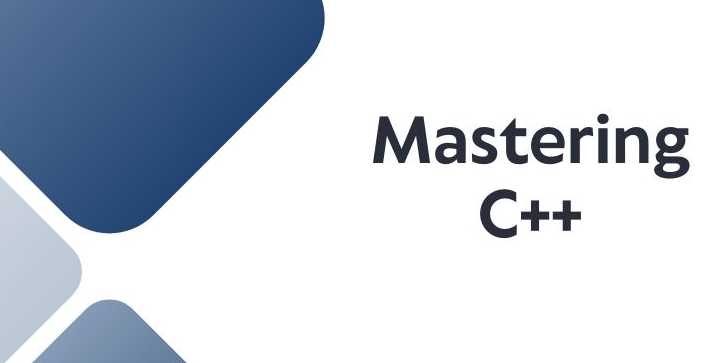Embark on a journey of knowledge! Take the quiz and earn valuable credits.
Take A QuizChallenge yourself and boost your learning! Start the quiz now to earn credits.
Take A QuizUnlock your potential! Begin the quiz, answer questions, and accumulate credits along the way.
Take A QuizMastering C++: From Fundamentals to Advanced Programming

Overview
✅ Introduction (500–600 words):
C++ is a foundational programming language that has
withstood the test of time. Developed in the early 1980s by Bjarne
Stroustrup, C++ was designed as an extension of C, integrating object-oriented
programming (OOP) while maintaining the power and performance of low-level
memory manipulation.
Whether you're a student aiming to crack technical
interviews, a developer entering the world of system-level programming, or an
aspiring competitive coder — C++ is a language you must master.
🔹 Why Learn C++?
C++ strikes a perfect balance between high-level
abstraction and low-level control. This makes it ideal for a wide
range of applications, including:
- Game
development (Unity, Unreal Engine)
- Embedded
systems and firmware
- Operating
systems (Linux, Windows internals)
- Finance
and trading systems (due to high performance)
- Competitive
programming and algorithm development
Despite the rise of modern languages like Python,
JavaScript, and Go, C++ remains irreplaceable in domains where
performance and memory efficiency matter the most.
🔹 Key Features of C++:
- Compiled
and statically typed: Helps catch bugs at compile time
- Supports
OOP: Classes, inheritance, polymorphism, encapsulation
- Standard
Template Library (STL): Ready-to-use data structures and algorithms
- Memory
management: Pointers, dynamic allocation (new/delete)
- Multi-paradigm:
Supports procedural, object-oriented, and generic programming
- Cross-platform:
Works on almost every OS and architecture
🔹 What You’ll Learn in a
C++ Course or Guide:
A well-structured C++ series takes you through:
- Syntax,
variables, loops, and conditionals
- Arrays,
strings, and functions
- Object-Oriented
Programming (OOP)
- Pointers,
memory management
- File
handling and error management
- Advanced
topics: Templates, Exception Handling, STL
- Real-world
projects and use cases
🔹 C++ in the Real World
|
Industry |
Use Case |
|
Gaming |
Game engines like Unreal Engine |
|
Finance |
High-speed algorithmic trading software |
|
Automotive |
Firmware and onboard systems |
|
Web browsers |
Chrome and Firefox internals |
|
Compilers |
Clang, GCC developed using C/C++ |
|
Robotics |
Control systems and performance code |
🔹 C++ for Interviews
& Competitive Programming
C++ is the go-to language for competitive programming
due to:
- Fast
execution speed
- STL
(vector, set, map, etc.)
- Rich
library of functions
- Tight
control over memory and performance
Sites like LeetCode, Codeforces, HackerRank,
and GeeksforGeeks frequently feature C++ as a default language for
solutions and tutorials.
Whether you're starting fresh or revisiting your
fundamentals, learning C++ opens doors to mastering system-level programming
and algorithms that run the world.
FAQs
1. What is C++ used for today?
C++ is used in game development, operating systems, compilers, IoT, robotics, and performance-critical applications
2. Is C++ beginner-friendly?
- ✅
Yes — it’s a
great first language, though it requires understanding of memory
management and syntax.
3. What’s the difference between C and C++?
C is procedural; C++ supports both procedural and object-oriented programming
4. How is memory managed in C++?
Using
pointers, references, and manual memory control with new and delete.
5. What is the STL in C++?
The Standard Template Library is a powerful collection of classes like vector, set, map, and queue.
6. Is C++ still relevant in 2025 and beyond?
✅ Absolutely. It's critical in industries like gaming, defense, automotive, and finance
7. Can I build web apps with C++?
Not commonly — C++ is not typically used for frontend or backend web apps. However, it powers backend engines in browsers.
8. Is C++ used in machine learning?
Yes, many machine learning libraries (like TensorFlow) have C++ backends for performance.
9. How hard is it to switch from C++ to Python?
Very easy — once you’ve mastered C++, most modern languages feel simpler.
Posted on 08 Apr 2025, this text provides information on c++. Please note that while accuracy is prioritized, the data presented might not be entirely correct or up-to-date. This information is offered for general knowledge and informational purposes only, and should not be considered as a substitute for professional advice.
Similar Tutorials

Advanced Excel Charts Tutorial: How to Create Prof...
Learn how to create professional charts in Excel with our advanced Excel charts tutorial. We'll show...

Advanced Excel Functions: Tips and Tricks for Boos...
Are you tired of spending hours working on Excel spreadsheets, only to find yourself stuck on a prob...

Apache Flume Tutorial: An Introduction to Log Coll...
Apache Flume is a powerful tool for collecting, aggregating, and moving large amounts of log data fr...
Explore Other Libraries
Related Searches
Please allow ads on our site
Please log in to access this content. You will be redirected to the login page shortly.
Login
Join Our Community Today
Ready to take your education and career to the next level? Register today and join our growing community of learners and professionals.

Your experience on this site will be improved by allowing cookies. Read Cookie Policy
Your experience on this site will be improved by allowing cookies. Read Cookie Policy


Comments(0)